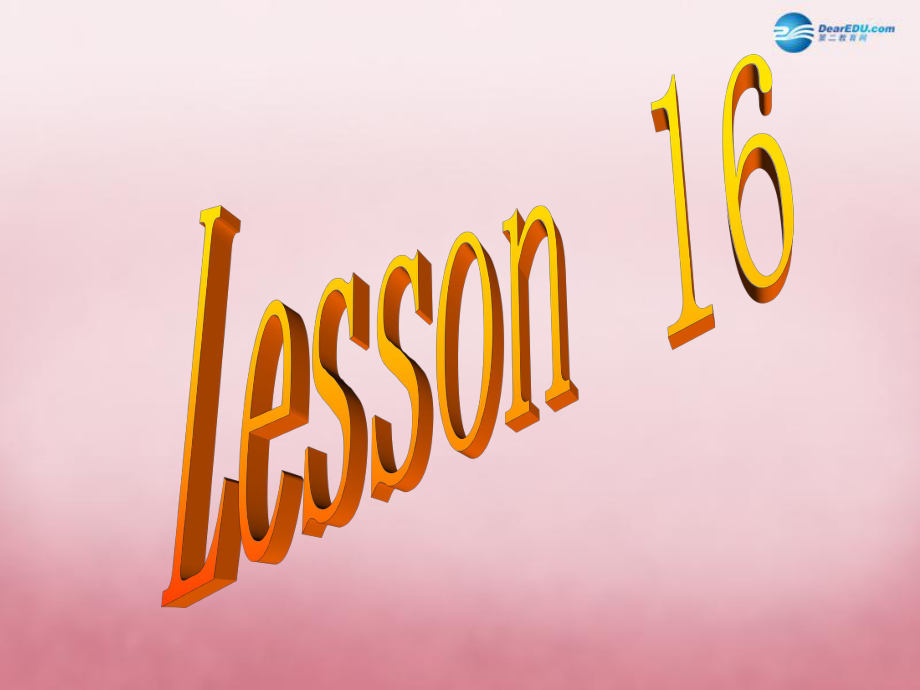《冀教初中英語八上《Lesson 16 Happy Thanksgiving!》PPT課件 (4)》由會(huì)員分享��,可在線閱讀�,更多相關(guān)《冀教初中英語八上《Lesson 16 Happy Thanksgiving!》PPT課件 (4)(20頁珍藏版)》請(qǐng)?jiān)谘b配圖網(wǎng)上搜索。
1����、Present Perfect Tense(現(xiàn)在完成時(shí)現(xiàn)在完成時(shí)):結(jié)構(gòu):結(jié)構(gòu):助動(dòng)詞助動(dòng)詞 have/has+p.p.(過去分詞過去分詞)用法:用法:1.表示過去發(fā)生或已經(jīng)完成的某一動(dòng)作對(duì)現(xiàn)在造表示過去發(fā)生或已經(jīng)完成的某一動(dòng)作對(duì)現(xiàn)在造 成的影響和結(jié)果�。成的影響和結(jié)果�����。I have finished my homework.2.表示過去已經(jīng)開始����,持續(xù)到現(xiàn)在的動(dòng)作或狀態(tài),表示過去已經(jīng)開始���,持續(xù)到現(xiàn)在的動(dòng)作或狀態(tài),經(jīng)常和表示從過去某一時(shí)刻延續(xù)到現(xiàn)在(包括經(jīng)常和表示從過去某一時(shí)刻延續(xù)到現(xiàn)在(包括 “現(xiàn)在現(xiàn)在”在內(nèi))的一段時(shí)間的狀語連用��。在內(nèi))的一段時(shí)間的狀語連用���。She has lived in B
2���、eihai for 20 years.I have been at this school for 13 years.He has taught us since(自從自從)last year.She has taught us a lot.She hasnt taught us a lot.Has she taught us a lot?Yes,she has.No,she hasnt.I have had my lunch.I havent had my lunch.Have you had your lunch?Yes,I have.No,I havent.現(xiàn)在完成時(shí)和一般過去時(shí)的區(qū)別:
3、現(xiàn)在完成時(shí)和一般過去時(shí)的區(qū)別:現(xiàn)在完成時(shí)現(xiàn)在完成時(shí):強(qiáng)調(diào):強(qiáng)調(diào)現(xiàn)在的情況現(xiàn)在的情況���,不能和表示過去的時(shí)��,不能和表示過去的時(shí) 間狀語連用�����,如:間狀語連用�����,如:yesterday,last night,three weeks ago,in 1990等���,但常和等�,但常和already,never,ever,just,before,yet,since 等狀語等狀語 連用���。連用���。一般過去時(shí)一般過去時(shí):只表示:只表示過去的動(dòng)作或狀態(tài)過去的動(dòng)作或狀態(tài),和現(xiàn)在沒有任�����,和現(xiàn)在沒有任 何關(guān)系����,常和表示過去的時(shí)間狀語連用���。何關(guān)系,常和表示過去的時(shí)間狀語連用����。I have seen the film.我看過這部電影。
4�����、我看過這部電影�����。I saw the film last week.我上星期看了這部電影����。我上星期看了這部電影���。用所給單詞的適當(dāng)形式填空:用所給單詞的適當(dāng)形式填空:1.She _(teach)us for two years.2.He _(teach)us last year.3.They _(live)here in 1973.4.She _(see)the film eight days ago.5.She _(see)the film.6.Yesterday Tom _(go)to school by bike.7.Mr.Li _ (teach)us since September.has
5���、 taughttaught livedsawhas seenwent _has taught _時(shí)態(tài)時(shí)態(tài)結(jié)構(gòu)結(jié)構(gòu)標(biāo)志標(biāo)志一般現(xiàn)在一般現(xiàn)在一般過去一般過去現(xiàn)在進(jìn)行現(xiàn)在進(jìn)行一般將來一般將來現(xiàn)在完成現(xiàn)在完成原形或三單原形或三單always,usually,often,sometimes,every day 過去式過去式y(tǒng)esterday,last night,two weeks ago,in 1990 be+v-ingnow,Listen!,Look!will+動(dòng)原動(dòng)原be going to+動(dòng)原動(dòng)原tomorrow,next week,next yearhave/has+p.p.already,n
6、ever,ever,forsince,just,yet,before時(shí)間表達(dá)法(一)時(shí)間表達(dá)法(一)1.整點(diǎn)的表達(dá):整點(diǎn)的表達(dá):用用“數(shù)字或基數(shù)詞數(shù)字或基數(shù)詞+oclock”表示表示6:00 6 oclock six oclock12:00 12 oclock twelve oclock6:30 six thirty7:45 seven forty-five8:01 eight o one (o 讀字母讀字母o音音)2.非整點(diǎn)的表達(dá):非整點(diǎn)的表達(dá):時(shí)時(shí)+分分時(shí)間表達(dá)法時(shí)間表達(dá)法(二)(二)a)表示表示“幾點(diǎn)過幾分(幾點(diǎn)過幾分(30分鐘以內(nèi)�,包括分鐘以內(nèi)�����,包括30分鐘)分鐘)”用用“分鐘數(shù)分鐘數(shù)
7��、past整點(diǎn)數(shù)整點(diǎn)數(shù)”表示��。常用表示���。常用half 代替代替30 分鐘分鐘(thirty),用���,用a quarter代替代替15分鐘分鐘(fifteen)��。如如:9:20 twenty past nine 8:30 half past eight 10:15 a quarter past tenb)表示表示“幾點(diǎn)差幾分(超過幾點(diǎn)差幾分(超過30分)分)”用用“分鐘數(shù)分鐘數(shù)to整點(diǎn)數(shù)整點(diǎn)數(shù)”表示��。表示�。如如:4:50 ten to five.(即(即5點(diǎn)還差點(diǎn)還差10分)分)7:45 a quarter to eight1.整點(diǎn)的表達(dá):用整點(diǎn)的表達(dá):用“數(shù)字或基數(shù)詞數(shù)字或基數(shù)詞+oclock”表
8�����、示表示2.非整點(diǎn)的表達(dá):非整點(diǎn)的表達(dá):9:003:155:307:056:452:558:26 9 oclock nine oclock a quarter past three half past five five past seven a quarter to seven five to three twenty-six past eight 12:004:159:308:053:456:507:24122134567891011121211223344556677889910101111Whats the time?Its“five to three.”ten past threetw
9���、enty-five to fourten after three122134567891011121211223344556677889910101111Whats the time?Its“a quarter to three.”a quarter past threehalf past threea quarter after threehalf after three1.How many subjects do you study?What are they?2.Whats your favourite subject?Think about it!3.Whats Li Mings fa
10����、vourite subject?Make a guess.Chinese math(s)Englishhistory geography biology P.E.physics politics art music computer1.How long has Li Ming lived in Shijiazhuang?2.What subject does Li Ming like best?3.Has Li Ming visited Canada?4.What subject is Wang Mei not good at?physicsListen and catch the answe
11、rs:Read quickly and answer the questions:Whats the main idea(主要意思主要意思)of each paragraph?Paragraph 1Paragraph 2Paragraph 3Paragraph 4Introduce himself and his city.his favourite subjectHow does he learn English?a new subject,physics Read carefully and answer the questions:1.Where is Shijiazhuang?2.Wh
12�����、at does Li Ming think of it?3.Which grade is Li Ming in?4.Why does Li Ming like English best?Read carefully and answer the questions:1.Li Ming likes reading,doesnt he?What does he often do?2.Does he have a few Canadian friends?What do they often do?3.Who helped him with his English?4.Wang Mei isnt g
13���、ood at physics,is she?Who can help her?Yes,he does.是的�,他喜歡����。是的,他喜歡���。No,she isnt.是的�,她不擅長是的��,她不擅長Language notes:4.borrow from 6.forget to do sth.forget doing sth.He forgot to turn out the light yesterday evening.He forgot turning out the light.2.sometime in the future1.a lot =very much3.such as 5.a few+可數(shù)名詞的復(fù)數(shù)形式可數(shù)名詞的復(fù)數(shù)形式someUseful sentences:1.I have lived here for fourteen years.2.Of all the subjects,I like English best,because its so useful and interesting.3.Its very important for us to learn it well.4.We often talk and write e-mails in English.下課 再見
 冀教初中英語八上《Lesson 16 Happy Thanksgiving!》PPT課件 (4)
冀教初中英語八上《Lesson 16 Happy Thanksgiving!》PPT課件 (4)

